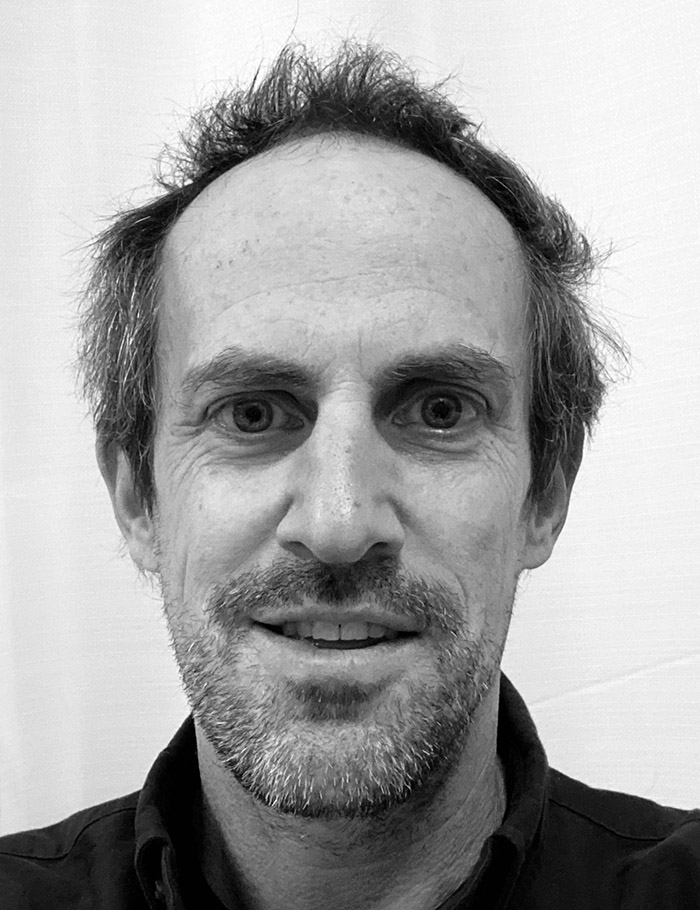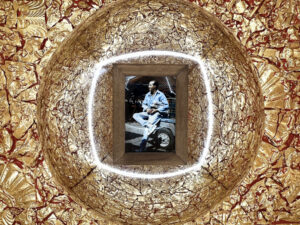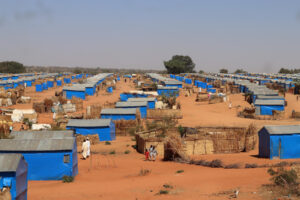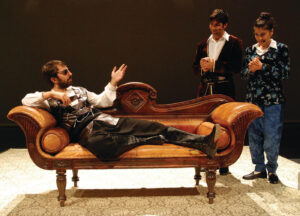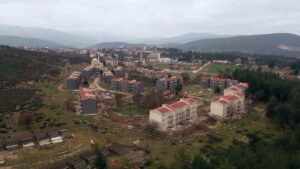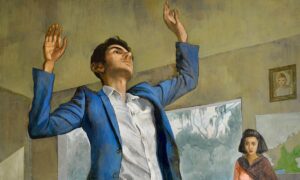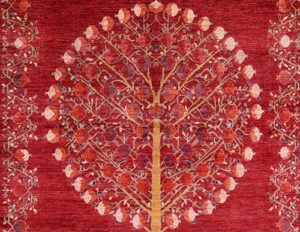Stories of otherness, refugees and war, captured by a writer grappling with his own place in the world, characterize a new collection translated from the Kurdish.
The Potato Eaters by Farhad Pirbal
Deep Vellum
ISBN 9781646052707
Displaced authors — be they refugees, emigrants, or merely willing wanderers far from home — often use fiction to help process their traumas and triumphs, their hopes and nightmares. It’s less common to see a writer tackle those feelings with the fervid creativity that Farhad Pirbal displays in his story collection The Potato Eaters. A prolific author in his native Kurdish, churning out nearly four decades worth of plays, poetry, novels, and nonfiction, Pirbal’s writing has never appeared in English until now, thanks to Jiyar Homer and Alana Marie Levinson-LaBrosse’s translation of The Potato Eaters. On the strength of these fifteen stories, which range from traditionally autobiographical to boldly experimental, whimsical to grievous, often within the same piece, I’m eager to read more from him.
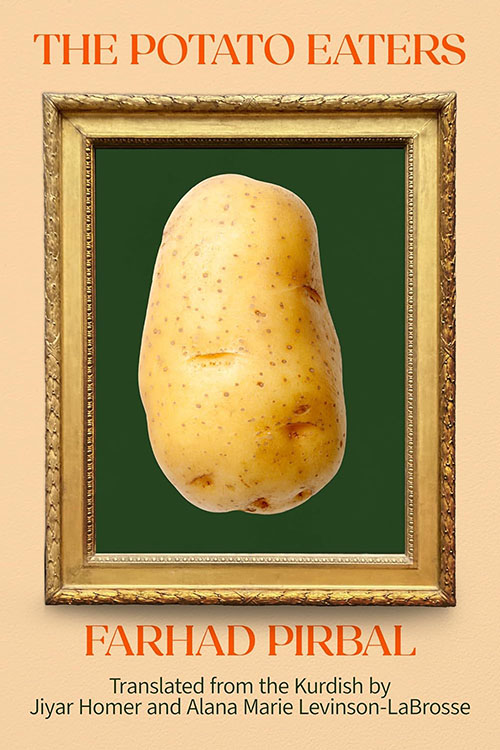
Written between 1979 and 1999, these stories represent roughly the first half of Pirbal’s career. They are not arranged chronologically in the collection, but nearly every story concludes with a dateline (e.g., Paris 1991) and I found it helpful to consider the order in which they were written. The three oldest — “The Brand on the Back of My Hand,” “A New Address,” and “Zaynab and More” — concern a young man, roughly the same age as Pirbal when he wrote them, dealing with “bitter childhood memories,” self-loathing, and classical feelings of youthful disaffection, including anger toward his father. By the third of these stories, the young man’s desperation and unhappiness have become so intense that he picks up a knife to take his own life, dropping it only when his little brother wakes up and sees what he is doing. All three stories were written by the time Pirbal was twenty, and capture both the brash, frequently egocentric, perspective of youth and the more existential feelings of profound loneliness and isolation that characterize the collection’s later stories, written after Pirbal graduated from university in 1984 and subsequently fled his hometown of Hawler, also called Erbil.
Though conventional in their seemingly autobiographical origins, these early stories already showcase Pirbal’s poetic tendencies — beautifully revealed throughout Homer and Levinson-LaBrosse’s skillful translation. In “The Brand on the Back of My Hand,” the narrator probes the depths of his mind by wondering “How is the dark cave of my anguish and aberration abruptly awash with light?” And in “A New Address,” the naturalistic metaphors continue with another question: “Ah, why doesn’t the flood of that happiness run through the desert of my heart?” That story also contains a lengthy, impassioned reflection on what it means to be a writer whose creative fires are stoked by the sorrows of others:
How can you write the stories of millions of starving, displaced, friendless, abandoned people? With the blood of hundreds of untimely deaths and martyrs and murder victims as your pen’s ink? Entire lands swallowed up by earthquakes or volcanic eruptions, people of the world hurting, stripped, starving, so hungry their bellies have distended, poor, dark-skinned women trying to nurse and so thirsty their breasts have run dry, children—girls—terrified as napalm suffocates them, entire villages burned . . . how can you . . . how can you write something like that and settle your unsettled heart? Ah, God, how long can a human body weep before it runs dry? You write through the tears. You still write.
While the stories in The Potato Eaters are consistently concerned with such lives, they consider them from a slight remove, generally centering the perspective of a refugee currently in or recently returned from Europe, which mirrors Pirbal’s path in the late 1980s. Biographical details are inconsistent, but after finishing university, he was drafted into Saddam Hussein’s Iraqi army and left for Europe via Iran and, according to some accounts, Syria. He spent time in Germany and Denmark before receiving a scholarship to the Sorbonne in Paris, where he earned a doctorate in Kurdish literature, and finally returned to Kurdistan in the mid-1990s. Pirbal amusingly sends up the impracticality of literary studies in the satirical “Lamartine,” where a Sorbonne grad, whose only experience is writing poetry and studying “the rhyme schemes” of the title poet, visits a Parisian unemployment office. The bureaucratic set piece gives way to a ghostly encounter before Pirbal caps the story with a winkingly rhymed poetic flourish of his own: “and all the while his steps wept, the tears falling thick and quick…”
By the late 1980s, Pirbal’s stories became more experimental in both their form and use of language, a change that could have been born out of his physical dislocation, the growing influence of his lyrical side, or both. His first book of poetry was published in 1990, and along with The Potato Eaters, Deep Vellum is also issuing a collection of Pirbal’s poems titled Refugee 33,333, translated by Pshtiwan Babakr and Shook, drawn from a half-dozen of his individual books. The poems feel intensely personal, and while I won’t discuss them in depth here, they greatly added to my understanding of Pirbal’s life and the themes of alienation and isolation that are so prevalent in The Potato Eaters.
His poetry also helps fill in some of the historical background that readers unfamiliar with Kurdish history might not be aware of. For example, in the poem “Waste,” from 1999’s The Whiteness in the Blackness/The Blackness in the Whiteness, Pirbal laments that the first half of his life “was taken away from me by the two major wars of ‘74 and ‘80,” referring to outbreaks of sustained violence between Kurdish and Iraqi forces in the mid-1970s and the war between Iran and Iraq that persisted for most of the ’80s. None of the stories in The Potato Eaters are set on the battlefield, but several explore the casualties of war. “The Deserter” follows a Kurdish soldier who discovers that he has misplaced his right leg, an effective, if unsubtle, metaphor for the violence and division that has plagued Kurdistan. And “The Killing of a Turkish Soldier in Zakho” chronicles a fatal encounter between a Kurdish family and the titular soldiers, turning attention to the Kurds’ northern antagonists. Both stories show Pirbal expanding the narrative strictures of his earlier work, with “The Deserter” concluding with the missing leg writing a letter to the soldier, and “The Killing” developing entirely as a series of often contradictory statements from witnesses to and participants in the attack before directly engaging the reader with the blunt questions: “What would you do? What?”
The standout story in the collection, “The Desert,” is told by a young Kurdish narrator whose family has been exiled to the Ramadi desert in southern Iraq, “devoid and bone dry, as far as the eye can see.” In the eleven months since they were displaced, the boy has made friends with some of the Arab children in the nearby village and is spending the night at one of their homes when he learns that all Kurdish families are going to be displaced again. The next day we find the boy alone in “a squat cube: dark, humid, hot, smelling of piss and eggplant, the walls of cinder block and stone, patched with tin and scrap wood.” His family is gone. While the guards wait for their commander to awaken, they interrogate the child and groundlessly accuse him of being a spy. The word Kafkaesque gets carelessly tossed around an awful lot, but “The Desert” incontestably merits the term given the psychological distress and power imbalance that result from the boy’s otherness, the guards’ arbitrary decision-making, and both parties’ lack of clear understanding of the situation.
While “The Desert” evokes an increasingly helpless terror, Pirbal often drives home less acute but equally destabilizing emotions, such as the endlessly repetitive frustrations of being a refugee, the hopelessness that inevitably creeps in after months or years spent waiting to be granted asylum, or the despair that overtakes nostalgia as the separation from one’s homeland lapses into forgetfulness. In “A Refugee,” a refugee slowly loses his mind due to the series of events that result from his ordering ten bananas in a cafe. The story entangles the reader with its repetitious and increasingly maddening litany of clauses for each banana that accompanies every narrative development, along the lines of “The refugee, consumed by desire, ate the first banana and threw the peel onto the sidewalk, ate the second banana and threw the peel onto the sidewalk, ate the third banana and threw the peel onto the sidewalk, ate the fourth banana and threw the peel onto the sidewalk…” and so on.
A similar effect is achieved in the more narratively rich title story, which uses similar repetitive rhetorical devices to hammer home the burden that war places on a community. When the refugee Fereydun returns home, he finds that a “severe plague” ravaged his village during the thirteen years he was gone, resulting in them now depending entirely on potatoes for everything from sustenance to tithing to preparing the dead for the afterlife. Similar to the way the individual bananas are handled in “A Refugee,” Fereydun confronts a succession of friends and family who are all incredulous and disappointed that the only thing he brought back from his time abroad was a bag full of gold. One by one, they pose the same questions to Fereydun: “It’s all just gold?” “You didn’t bring any potatoes from abroad?” “Why didn’t you bring any potatoes from abroad?”
In the poem “Romantic Songs of Exile,” from 2004’s Different, Pirbal writes “Most mornings, when I wake up, immediately surprised, I look around, asking myself: ‘Where am I today?’” This disorientation is depicted formalistically in “Schizophrenia,” a choose-your-own-adventure style story about a Kurdish refugee named Bakhtiyar, who has been living in “an eleven-story refugee camp” south of Paris but is being sent to a “looney bin,” a “sanatorium to tend to mental patients.” As readers jump between the story’s fifteen boxes of text, they don’t really get any clear answers, and eventually end up bouncing back and forth between descriptions of Bakhtiyar’s life in exile and his life today, showing how nothing will change for him.
Feeling divorced from the reality of one’s situation is a consequence of not only being a refugee, but dealing with mental health issues. As third-party introductions to both The Potato Eaters and Refugee 33,333 emphasize, Pirbal has been increasingly dogged by such battles, which have contributed to him burning a bookstore to the ground, confronting government officials, and going to jail more than once. He has stated that he is “not well.” His family members have pleaded for him to get help that is seemingly not available in Kurdistan. As Shook writes in the introduction to Refugee 33,333, Pirbal has become as well known in Kurdistan for his “highly publicized antics as for his prolific literary output.” Such notoriety is sadly unsurprising in our gawking, social media age, but it is also a consequence of the continued conflation of the paradigm of the tortured genius with the serious scourge of mental illness.
Porochista Khakpour, in her introduction to The Potato Eaters, seems to confuse the two when she writes that Pirbal exists “for the messy artists who make everyone a bit nervous with their insistence on messes; he’s gonna wreck someone’s night but you hope it’s not yours so you can just watch.” There is a profound difference between taking perverse — if guilty — pleasure in watching a personality wreck someone’s night and in seeing said personality come dangerously close to hurting themself or others. It’s the difference between being seen as one of the “few truly outlandish iconoclasts,” as Khakpour calls Pirbal, and being acknowledged as one of the too many in our society suffering from “full-blown, untreated illness,” as Shook writes. I’m not here to tell anyone how to enjoy their art, but as English-speakers come to appreciate Pirbal’s laudable craft through The Potato Eaters, his poetry, and hopefully a translated novel or two in the future, I would hope that we are careful to distinguish between — and attend to — cries for help and cries for attention.




